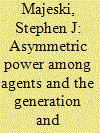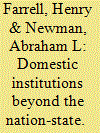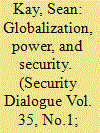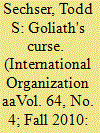|
|
|
Sort Order |
|
|
|
Items / Page
|
|
|
|
|
|
|
| Srl | Item |
| 1 |
ID:
052407


|
|
|
|
|
| Publication |
June 2004.
|
| Summary/Abstract |
The question addressed in this analysis is whether endowing agents with various forms of asymmetric power makes cooperation more likely across a variety of structural settings of conflict and cooperation present in international relations. To address this question, an agent-based model incorporating asymmetric power among agents in a set of (2 2) games that represent different forms of conflict and cooperation prevalent in international relations (Chicken, Stag, Assurance, Deadlock, and Prisoner's Dilemma) is developed and analyzed via simulation. Simulation results indicate that the introduction of asymmetric power substantially increases the chances that both cooperative agents survive and cooperative worlds evolve. This is particularly the case when agents are endowed with the ability to selectively interact with other agents. Also, anticipated variations in outcomes across the game structures regarding the likelihood of cooperation are supported.
|
|
|
|
|
|
|
|
|
|
|
|
|
|
|
|
| 2 |
ID:
129992


|
|
|
|
|
| Publication |
2014.
|
| Summary/Abstract |
What is the relationship between domestic and international politics in a world of economic interdependence? This article discusses and organizes an emerging body of scholarship, which the authors label the new interdependence approach, addressing how transnational interactions shape domestic institutions and global politics in a world of economic interdependence. This literature makes three important contributions. First, it examines how domestic institutions affect the ability of political actors to construct the rules and norms governing interdependent relations and thus present a source of asymmetric power. Second, it explores how interdependence alters domestic political institutions through processes of diffusion, transgovernmental coordination, and extraterritorial application and in turn how it changes the national institutions mediating internal debates on globalization. Third, it studies the shifting boundaries of political contestation through which substate actors affect decision making in foreign jurisdictions. Given the importance of institutional change to the new interdependence agenda, the authors suggest several instances where historical institutionalist tools might be exploited to address these transnational dynamics, in particular, mechanisms of cross-national sequencing and change strategies of substate actors. As globalization continues, it will be ever more difficult to examine national trajectories of institutional change in isolation from each other. Equally, it will be difficult to understand international institutions without paying attention to the ways in which they both transform and are transformed by domestic institutional politics. While the new interdependence approach does not yet cohere as a single voice, the authors believe that it offers an innovative agenda that holds tremendous promise for both comparative and international relations research as it calls on scholars to reconsider the dynamic nature of globalization for global politics.
|
|
|
|
|
|
|
|
|
|
|
|
|
|
|
|
| 3 |
ID:
052550


|
|
|
| 4 |
ID:
099875


|
|
|
|
|
| Publication |
2010.
|
| Summary/Abstract |
States typically issue compellent threats against considerably weaker adversaries, yet their threats often fail. Why? Expanding on a standard model of international crisis bargaining, I argue that a theory of reputation-building can help shed light on this puzzle. The model casts reputation as a strategic problem, showing that challengers issuing compellent threats have incentives to anticipate the reputation costs that target states incur when appeasing aggressors. If challengers can recognize these costs and offset them with side payments or smaller demands, then even reputation-conscious targets will acquiesce. I argue, however, that military strength contributes to information problems that make challengers more likely to underestimate their targets' reputation costs and insufficiently compensate them. In this way, military power can undermine the effectiveness of compellent threats. The logic is illustrated by the 1939 Russo-Finnish crisis, and the argument's implications for the study of coercive diplomacy are explored.
|
|
|
|
|
|
|
|
|
|
|
|
|
|
|
|
|
|
|
|
|